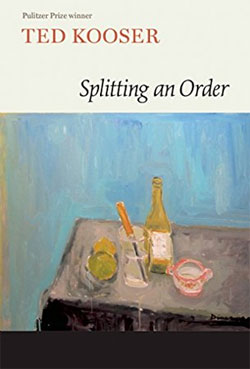“Every block of stone has a statue inside it and it is the task of the sculptor to discover it,” says a quote attributed to Michelangelo. Translated for the task of writing poetry, it might say, “Every detail of life contains a poem, it is the task of the poet to discover it.“
This is the work of Pulitzer Prize winner and former U.S. Poet Laureate Ted Kooser: to chisel away at the stone of everyday life and discover the poetry already hiding inside. Kooser’s new collection, Splitting an Order (Copper Canyon Press, $23), does just that: Kooser’s careful observations of objects, animals, people and places reveal the beauty that exists everywhere around us.
Kooser’s credentials are imposing, but his poetry is not. His verses are soft, gentle and sometimes melancholy descriptions of the minutiae of life. These poems aren’t merely descriptive, they’re also quiet ruminations on change, longing, and the bittersweet passage of time.
The poem from which the collection draws its title is about a man sharing a roast beef sandwich with his wife: “I like to watch an old man cutting a sandwich in half, / maybe an ordinary cold roast beef on whole wheat bread.” But this entire collection of poems also functions as an extended invitation to split an order. Kooser carefully divides up the moments of life and asks us to partake in their restrained beauty.
… Today, on a bench
in a dark garage it’s upside down,
a miniature galvanized tub adrift
on time, and in it two survivors,
a bolt that once held everything
together, season in and season out,
and a wing nut resting its wings.from “Zinc Lid”
It is a testament to his craft that Kooser’s poetry appears so effortless, so transparent. This simplicity is deceptive, for his words act as gateways to a different way of seeing, full of subtle signposts that guide us through the commonplace, almost banal subject matter.
A dead fly, a lunch at Arby’s, driving through a pile of leaves, a father and son descending a staircase, an approaching rollerblader, an uncleaned fishtank: these are all chances to see and feel the world in a fresh way. In the commonplace Kooser finds exquisite beauty, inviting us to open our eyes, to look at the tiniest details for the first time.
What can be read in the open book
of an old brass door hinge? Here are two
in a coffee can, one of them coated
with cream-colored paint and one brown,
the first from a door that once swung
into the kitchen and out, fanning
the fragrance of pot roast, its paint
worried and chipped; the other from
the cold brown door to the attic stairs
that was rarely opened, behind which stood
winter, wearing an old woolen coat
with mothballs loose in his pockets.
The first hinge swung smooth on a film
of black oil from bacon and chops;
the other cried out through the frost.from “Estate Sale”
Emily Dickinson wrote: “If I read a book and it makes my whole body so cold no fire can warm me I know that is poetry. If I feel physically as if the top of my head were taken off, I know that is poetry. These are the only way I know it. Is there any other way?”
Ted Kooser shows us another way. His poetry is warming, reassuring and refreshing. It doesn’t take the top of your head off, it sidles up alongside you, keeping a steady pace as it walks with you through life.
At A Kitchen Table
Not a flock of stories,
not usually,
but a few that arrive at dusk,
in pairs, quietly
creating themselves
in the feathery light.
And rarely with fancy plumage
of blue or green or red
but plain, as of clay or wood,
with a plain little song.
Theirs are the open wings
we light our table by.
 Dan Wilkinson
Dan Wilkinson
Dan is the Executive Editor of the Unfundamentalist blog. He is a writer, graphic designer and IT specialist. He lives in Montana, is married and lives with two cats.

Leave a Reply